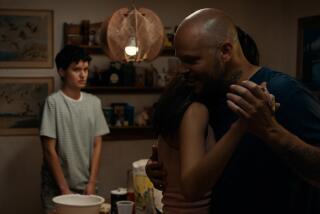A Sweeping Lesson on the Importance of Family
I don’t speak very often with my brother Roberto, who lives with his wife and baby boy in the Bay Area, where we grew up. So my call to him Monday morning came as a surprise. His quizzical ‘Hello?’ told me he was anticipating some news or announcement. Otherwise, why would his brother be calling from L.A. on a weekday?
“I just called to say ‘Hi,’ ” I kidded. “Como amanecieron? (How is everybody this morning?)”
Roberto is a psychotherapist and not easily fooled by insincerity. He played along.
“Oh, you must have the day off,” he said dryly, fishing for an occasion to explain my contact.
“Can’t a brother just call to be friendly?” I retorted.
The question was rhetorical, but I was no longer joking. I have long wondered why our family of eight siblings has drifted apart so steadily since our mother passed away seven years ago in May.
Parents have a way of holding their children together (our father died in 1976). In their absence, families sometimes scatter, even disintegrate. When the center is missing, the parts peel away in separate orbits, propelled by some strange centrifugal force that smashes the nuclear family.
Married siblings start spending more holidays with their spouses. There are fewer reunions and no perfect place to have them. Long trips become less attractive without the parental pull.
The Gurzas, five boys and three girls, are all over the map. Our eldest brother is in Chicago; our eldest sister in Santa Rosa. I’m third, adrift in Southern California. The rest live in Fresno, Santa Cruz and San Jose.
We still enjoy each other when we get together once or twice a year. We just don’t try hard enough to preserve the ties that weaved through our childhood.
Sharing bunk beds and bruises. Teaching each other to ride bikes and drive cars. Surviving earthquakes and teenage crushes.
Only siblings can be so close. We share DNA and a womb, then emerge to discover the world together. So why let the world push us apart?
Roberto and I debated on the phone heatedly like, well, brothers. I contend we’re suffering the symptoms of assimilation, finding U.S success at the expense of Mexican family values. We are more Americanized--more distant--in our fraternal dealings. And I say that’s sad.
He says it’s hard to emulate a family structure our parents left behind when they migrated from Mexico, where most of their relatives remained.
“They were disconnected, so we are,” says Roberto. Now, he argues, we’re left with the task of trying to do something they couldn’t do across borders: keep a close, daily relationship with siblings.
Still, our parents managed to inculcate some basic principles of Mexican families. Respect and obey your elder siblings (hermanos mayores). Be responsible for the younger ones and protect them. Stay close through good times and bad.
Those were the same values Salvador and Margarita Avila drilled into their six children. Like Italian and Irish immigrants before them, the Avilas used family as the foundation for economic prosperity. Today, the clan owns Avila’s El Ranchito, a chain of seven restaurants in L.A. and Orange counties.
Success didn’t separate them. All but one of the grown children live in Newport and Corona del Mar, clustered village-like within minutes of their parents’ home on Spyglass Hill. Only one brother lives “far away”--in San Juan Capistrano.
The closeness is healthy for the family, says Margarita, the youngest child and a psychotherapist. The siblings fight and forgive each other. Family always comes first.
I always see Margarita and her older sister, Maria Elena, together at community functions. They seem inseparable, and now I know why. Margarita, who never married, helped Maria Elena raise her daughter, Lisa, after a divorce.
Now Lisa, 29, a young prosecutor in Orange County, is planning to marry Tim Broussard, who’s also a lawyer. Her fiance says the idea of so much family togetherness has taken some getting used to. On Thanksgiving, though, he heard the family patriarch repeat a lesson he often told his children growing up.
Salvador Avila passed out brooms he had brought from Mexico. One strand alone can easily bend and break, he told his guests. But with strands tied together, the broom can do a lot.
Broussard got the message. He and Lisa will not be moving to Aliso Viejo as planned. Too far for an Avila. Instead, the young couple will settle just blocks from abuelito’s (grandpa’s) house.
The moral: Family unity is not a concept, it’s a choice.
So I think I’ll call my brother more often.
*
Agustin Gurza’s column appears Tuesday. Readers can reach Gurza at (714) 966-7712 or agustin.gurza@latimes.com


